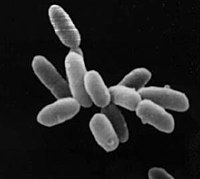
Photo from wikipedia
Abstract Conversion of organic wastes to methane via anaerobic digestion has been practiced for more than 160 years. However, the technical bottlenecks derived from the thermodynamic limitations of interspecies hydrogen/formate… Click to show full abstract
Abstract Conversion of organic wastes to methane via anaerobic digestion has been practiced for more than 160 years. However, the technical bottlenecks derived from the thermodynamic limitations of interspecies hydrogen/formate transfer (IHT/IFT) between syntrophs and methanogens resulting in the slow fermentation rate, low methane conversion efficiency and poor stability of system still limit its large-scale application. No engineering strategy to speed up IHT/IFT for dramatically changing the performances of anaerobic digestion has been developed. However, recent studies documented that simply pretreating organic wastes to produce ethanol could effectively accelerate and stabilize anaerobic digestion. This may be linked to the promotion of direct interspecies electron transfer (DIET), an alternative working mode that no longer requires hydrogen or formate as an electron carrier. Further information on how this strategy affects the function of methanogenic communities to clarify its advantages is required. In this study, we summarized the evidence that pretreating organic wastes to produce ethanol enhanced anaerobic digestion, discussed the link between ethanol and DIET, and emphasized how this strategy would be better applied in the future.
Journal Title: Energy
Year Published: 2021
Link to full text (if available)
Share on Social Media: Sign Up to like & get
recommendations!